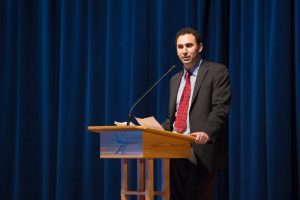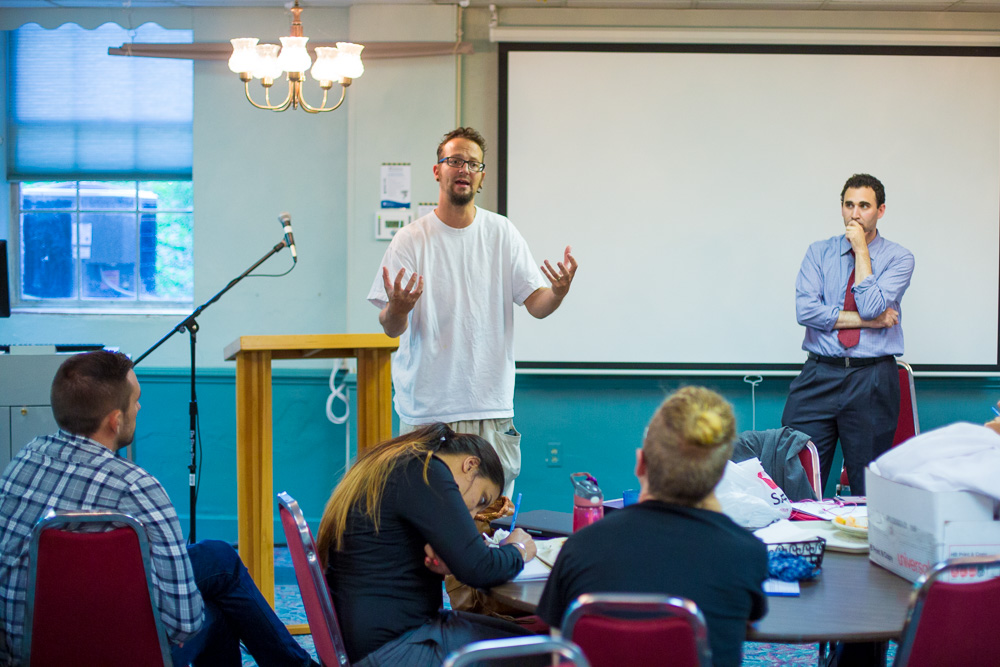It is not often we are challenged, head on, to rid the world of suffering by taking the words of Jesus literally. Eastern Mennonite University (EMU) students, faculty, and Harrisonburg community members faced this challenge in the Lehman Auditorium on Wednesday, Sept. 14. EMU was the place where Christian activist Shane Claiborne announced a partnership with the non-profit financial reform organization Jubilee USA Network. He joined with Andrew Hanauer, Jubilee’s campaign coordinator, to speak at chapel, and give a two-hour lunchtime discussion, an evening lecture and a late-night residence hall discussion.
Claiborne is co- founder, with Tony Campolo, of the Red Letter Christians movement, which encourages Christians to pay attention to Jesus’s teachings and combine those words with justice. Claiborne, a native of Tennessee, lives in a community in Philadelphia. He speaks widely and has written several books relating to radical Christianity, most recently “Executing Grace: How the Death Penalty Killed Jesus and Why It’s Killing Us” (HarperOne, 2016).

In his role as campaign director for Jubilee USA Network, Hanauer meets with Congress members, non-government organizations, and the World Bank to represent Jubilee’s advocacy efforts. He also leads Jubilee’s grassroots efforts.
“We have to recognize that the problem is deeper than ‘Someone is hungry’,”Hanauer says, “The question is ‘Why are they hungry’?” Jubilee wants to solve the poverty crisis at its root, not just its symptoms.
The idea behind Jubilee based on Leviticus 25, The Year of Jubilee was designated for canceling debt, freeing slaves, and resting the fields. This type of freedom language is also used in Isaiah 61:1-2 and Luke 4:16-30 to talk about Jesus’ coming to release captives and restore sight to the blind.
‘Return what we have stolen’
Claiborne’s message is that Christians are called to shake off complacency and alleviate the unequal distribution of wealth around the globe. Hanauer spoke on the efforts of Jubilee to cancel debt for impoverished nations. In 2015, Jubilee won over a billion dollars in debt relief in Chad, Grenada, Ethiopia, and West Africa.
Money plays a role in alleviating suffering across the globe, but Claiborne says relationships are the important part of making change. He says one shouldn’t be afraid to ask questions about what to do locally. Claiborne suggests pushing for transparency with the organizations that handle donations. Some of his own funds go toward Jubilee’s debt cancellation efforts.
Claiborne points out that sharing excess is necessary to reducing inequality. “[Saint] Basil the Great said, ‘If someone steals a person’s clothes, we call them a thief. But shouldn’t we say the same thing of the Christian who has extra clothes in their closet while another goes naked?’”
He used Saint Basil’s words as a reminder that holding on to excess is selfish. “There is enough for everyone’s need, but not enough for everyone’s greed,” Claiborne said.
Charitable giving is not a lofty virtue, Claiborne continued. “It’s returning what we’ve stolen … God didn’t create one person rich and another person poor. We’re actually just participating in the economy of God,” he says.
Audience challenged
Claiborne’s message resonated with several students in the audience. Senior Isaac Dahl, recalled an anecdote about a child in India who was given an ice cream cone and immediately knew he had to share it with his friends. “I realized that this child’s innocence and culture had taught him the beauty of sharing. This is far different from the message we get, which is from the Western assumption of entitlement,” Dahl said.
Most of the attendees were EMU students, but some members of the community spoke during the question-and-answer period. Most of the questions were about applying Claiborne’s message on a daily basis, and staying passionate about the words of Jesus. For example, Ruthie Beck, a 2016 EMU alumna and a current eighth-grade civics teacher, wanted to know how to maintain her fire for ending poverty and pass on Claiborne’s message.
“EMU does a good job of applying many of the things that Shane advocates for, but we can always do better,” said junior Caleb Schrock-Hurst. “Shane says that love is about relationships, and I think we could do a better job of being in relationship with the poor and needy here in Harrisonburg.”
This challenge to do better is echoed by junior Rachel Shenk. “I don’t see tonight’s message as a guilt trip or a crisis point,” Shenk said, “Instead, I believe it’s an opportunity for all of us here at EMU to proclaim jubilee by inviting others to join us as we work towards faithful stewardship of God’s gifts.”
Shenk appreciated that Claiborne brought into sharp focus the widening gap between the rich and the poor, “I’m challenged to realize that our current economy is not a reflection of God’s original vision.”
